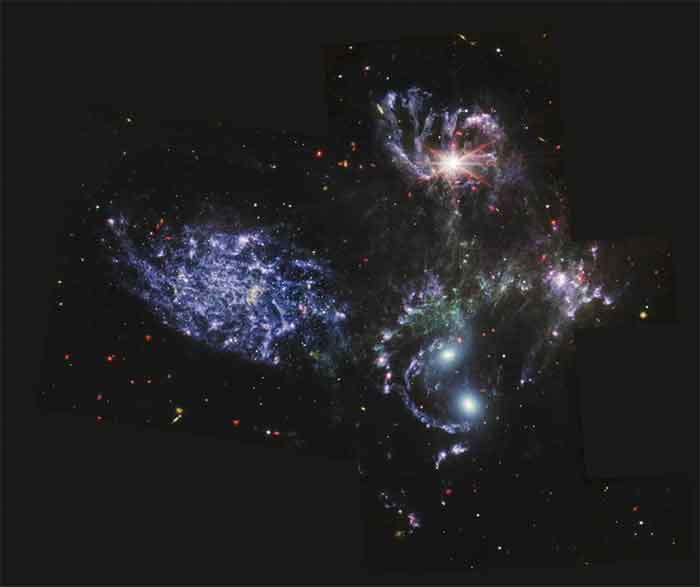
We have seen the startling images provided by the $10 billion James Webb telescope, images relentlessly hyped as an incredible scientific breakthrough by those involved in the research–but of no conceivable relevance or benefit to humanity as a whole. I would venture to say that, in a moral-humanistic sense, a single photo of a starving child (say, in Yemen) has more value than all the thousands of photos this “exciting” project will produce. Why? Because, as a species we are most benevolent and life-sustaining when we recognize universal human rights and needs–and respond, via sympathetic identification, accordingly.
Virtually all astrophysicists are now ebullient about the astounding possibilities for new discoveries made possible by the telescope. Some talk of discovering new “habitable exoplanets”–conveniently forgetting that reducing fossil fuel overconsumption and banning nuclear weapons, among other real priorities, might make the Earth more livable once more (besides slowing down species-extinction). (Not to mention the incredible unlikelihood–and utter pointlessness–of developing space vehicles capable of traveling close to the speed-of-light, 186,000 miles per second.)
Other NASA scientists are avowedly religious–and not in the abstract, pantheistic, Spinozan way that Einstein was. With the prospect of seeing back to the “beginning” of the universe some 14 billion years ago, they pathetically cling to the notion of a “Creator” (“Let there be light!”). No matter that the primitive folklore of the Book of Genesis is chock-full of contradictions and absurdities, all presided over by a remarkably cruel, wily, authoritarian-patriarchal “God” (merely a projection of the crude, violent, superstitious culture of the Hebrews 2000 years ago). Such scientists pathetically compartmentalize their belief in the Bible–with all its cruelties, violence, and fabrications–as a matter of “faith” (a domain of belief, in their rationale, quite separable from scientific validation).
The foremost benefit astronomy has contributed to human enlightenment has been the validation of Galileo’s heliocentric model of the solar system. The notion of a single, finite (and flat?) world, in which Man is given dominion over all “creatures” and is directly punished or rewarded by an all-observing God, was replaced by the reality of a solar system, as well as myriad distant stars, in which humans merely inhabited the revolving “third planet from the Sun.” (The Catholic Church, well aware of the dangers of such science, threatened Galileo, burned Giordano Bruno, and only reluctantly accepted heliocentrism in the mid-19th century.) At that time (ca. 1859), Darwin’s well-substantiated theories should have delivered the death-blow to religion. The First Amendment to the U.S. Constitution guarantees “freedom of religion,” and presumably scientists were reluctant to forcefully challenge the harmful and absurd doctrines of religions which continue to thrive today (with fundamentalist, biblical literalism even on the rise in recent decades!).
One embarrassment to these religiously-minded astrophysicists is that the “Big Bang” theory–one moment of “Creation” of an infinitely expanding universe–has been recently challenged by variations of the “Big Crunch” theory: with expansion eventually limited by certain laws of physics, the universe will begin to contract over endless billions of years, imploding back to its origins. This expansion-contraction cycle will continue to repeat itself, ad infinitum.
Meanwhile, Homo sapiens, a kind of hominoid primate which eventually evolved from the earliest mammals (of 70 million y.a.), is obviously entirely adapted to its terrestrial habitat. Breathing its atmosphere, walking bipedally and using its hands to make tools, and ecologically co-inhabiting with myriad other plant and animal species which are mutually interdependent for survival. With industrial-produced emission-byproducts now threatening ever-escalating species extinctions, droughts, crop failures and massive famines, the astrophysicists’ single-minded fascination with incredibly remote galaxy systems–of no possible relevance to the inhabitants of Earth–verges on the obsessively delusional.
William Manson, psychoanalytic anthropologist and intellectual historian, previously taught at Rutgers and Columbia universities.










































